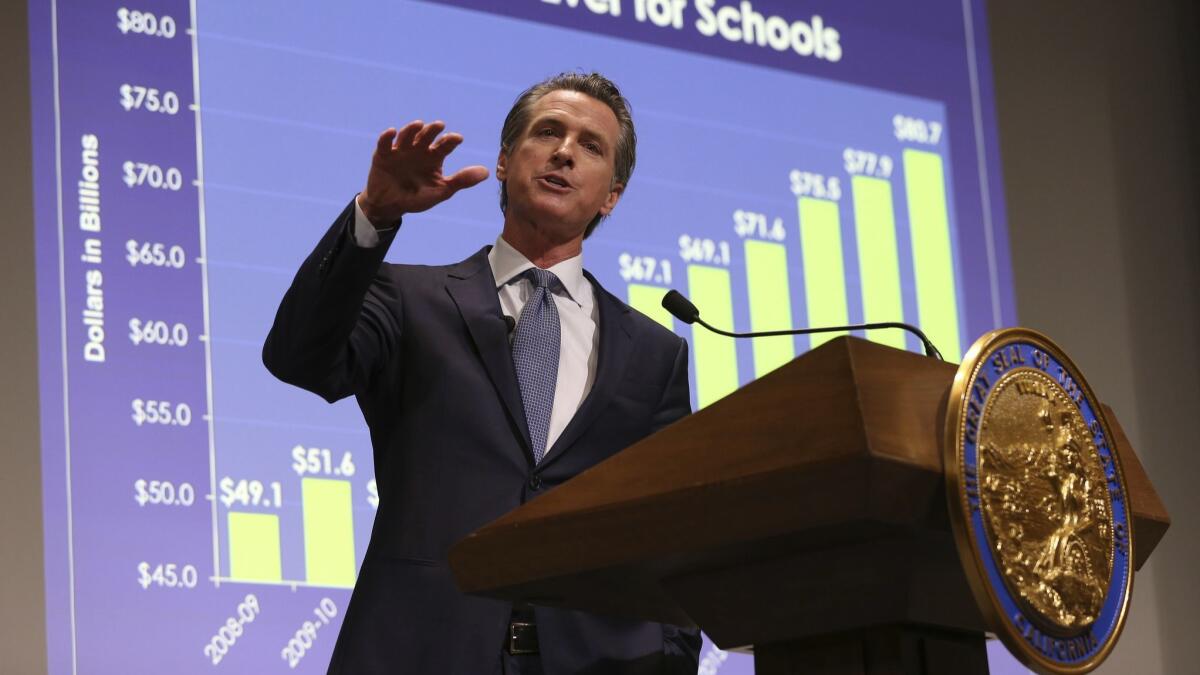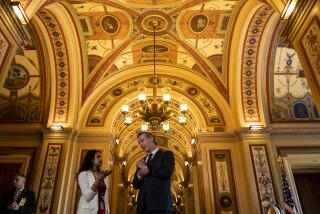Capitol Journal: Newsom’s struggles with dyslexia prompt a ‘very personal’ quest to fund early screening

Reporting from Sacramento — Gov. Gavin Newsom’s lifelong struggle with dyslexia makes his proposal to screen little kids for developmental disorders a personal mission.
California’s new governor wasn’t diagnosed with the reading disability until he was in the fifth grade.
“I got screened late,” Newsom, 51, told me. “I bounced around to five schools in seven years because I didn’t get the support. My mom kept trying different schools, looking for support. Back then, they didn’t know what this stuff was.
“I’d fallen behind, literally behind, and when that happens you tend to act accordingly. Finally someone diagnosed it. That allowed me to get support and self-confidence.”
Whatever guidance young Newsom got obviously worked. He graduated from Santa Clara University, created a successful wine and hospitality business, was twice elected San Francisco mayor, became lieutenant governor and then California’s 40th governor.
Anyone who watched Newsom’s recent inaugural speech on the Capitol steps saw him reading flawlessly off the teleprompter. He didn’t miss a beat even when his 2-year-old son, Dutch, leaped into his arms and stayed there.
In his $209-billion state budget proposal, Newsom asked the Legislature for roughly $100 million to fund developmental and health screenings for infants and toddlers in low-income families.
That’s a little-noticed slice of Newsom’s $1.8-billion proposed package of programs aimed at expanding early education and childcare for the poor.
I asked the governor if the developmental screenings were inspired by his struggles with dyslexia.
“Deeply so — 100%,” he replied. “It’s very personal for me.
“If you get those screens early, you can not only change a person’s life, you can save taxpayers a lot in the process.”
That’s because certain developmental disorders can lead to serious medical ailments that often require tax dollars to treat. At worst, they can lead to criminal behavior.
“I found out [about dyslexia] when I was in the fifth grade,” Newsom says. “My mother struggled with whether to tell me about it. She didn’t want me to have an excuse. She wanted me to work hard.”
Newsom says at least one — maybe two — of his four children has dyslexia.
“It is deeply painful not just for the kids, but for the parents watching them struggle,” he says.
“Unless you get the screening, the rest of your life you struggle.” But with trained help, a child can work around the disorder, he adds, and “later in life you find other strengths.”
The biggest chunk of Newsom’s package to help kids from poor families — and their parents — is his proposal to offer all-day kindergarten. Now, 22% of school districts provide only part-day kindergarten, a costly burden on working parents who must pay for expensive childcare after school.
Newsom also wants to provide full-day pre-kindergarten for all 4-year-olds from low-income families. He’d like to eventually include 3-year-olds.
Coverage of California politics »
“Most of the brain development work is done by the time you’re 4,” the governor says. “Getting 3-year-olds in [class] is the game-changer.”
OK, that’s a great idea. But why not provide pre-kindergarten classes for all kids, regardless of family income? The middle class gets shunted aside again.
There’s a reason why Social Security and Medicare — and K-12 public schools — are so popular everywhere. They’re not means tested. No one is rejected because of income.
Newsom asked the Legislature for $10 million to draw “a road map” to universal pre-kindergarten for every 3- and 4-year-old, regardless of family income. But liberal lawmakers would need to be persuaded to provide preschool for the upper middle class and wealthy.
“The consensus in the Legislature is that it’s not our goal to serve kids whose parents have the means to afford their own,” Assembly Speaker Anthony Rendon (D-Paramount) told me last month.
But full-time day care is unaffordable for many middle-class parents. It costs as much or more than tuition at the University of California — $1,000 a month and up.
The governor and legislators say there isn’t enough money for universal pre-kindergarten, not even with a projected budget surplus of around $21 billion.
“And even if we had all the resources in the world,” Newsom says, “we’re not prepared to spend that appropriately. We couldn’t even lease the facilities, couldn’t train the workforce. It’s not just about access. It’s about quality access.”
Assemblyman Kevin McCarty (D-Sacramento), who chairs the budget subcommittee on education finance, says it would cost $4 billion annually to include all 4-year-olds in pre-kindergarten. He has introduced legislation to cover poor children. He estimates that would cost $1.5 billion.
“I’d like nothing more than to afford it for all kids,” McCarty says. “But we have other priorities. We can start with the families who need it the most — where we get the biggest bang for the buck.
“Upper-middle-class families will pay for it on their own. And some of the middle-class families will just miss out.”
Senate Budget Committee Chairwoman Holly J. Mitchell (D-Los Angeles), who once ran one of the largest child development organizations in the country, Crystal Stairs, says, “If I had a magic wand, I absolutely would” provide early childhood education for everyone. “But we don’t even have enough money to pay for the lowest-income kids.”
Somehow they’ll find enough money for the poor kids and should — and make sure they’re screened for developmental disorders.
Famous people, including Steven Spielberg, Walt Disney, Leonardo da Vinci, Tom Cruise and Albert Einstein, have battled dyslexia.
California’s governor is the latest role model for youngsters struggling with the affliction.
Follow @LATimesSkelton on Twitter
More to Read
Get the L.A. Times Politics newsletter
Deeply reported insights into legislation, politics and policy from Sacramento, Washington and beyond. In your inbox three times per week.
You may occasionally receive promotional content from the Los Angeles Times.











